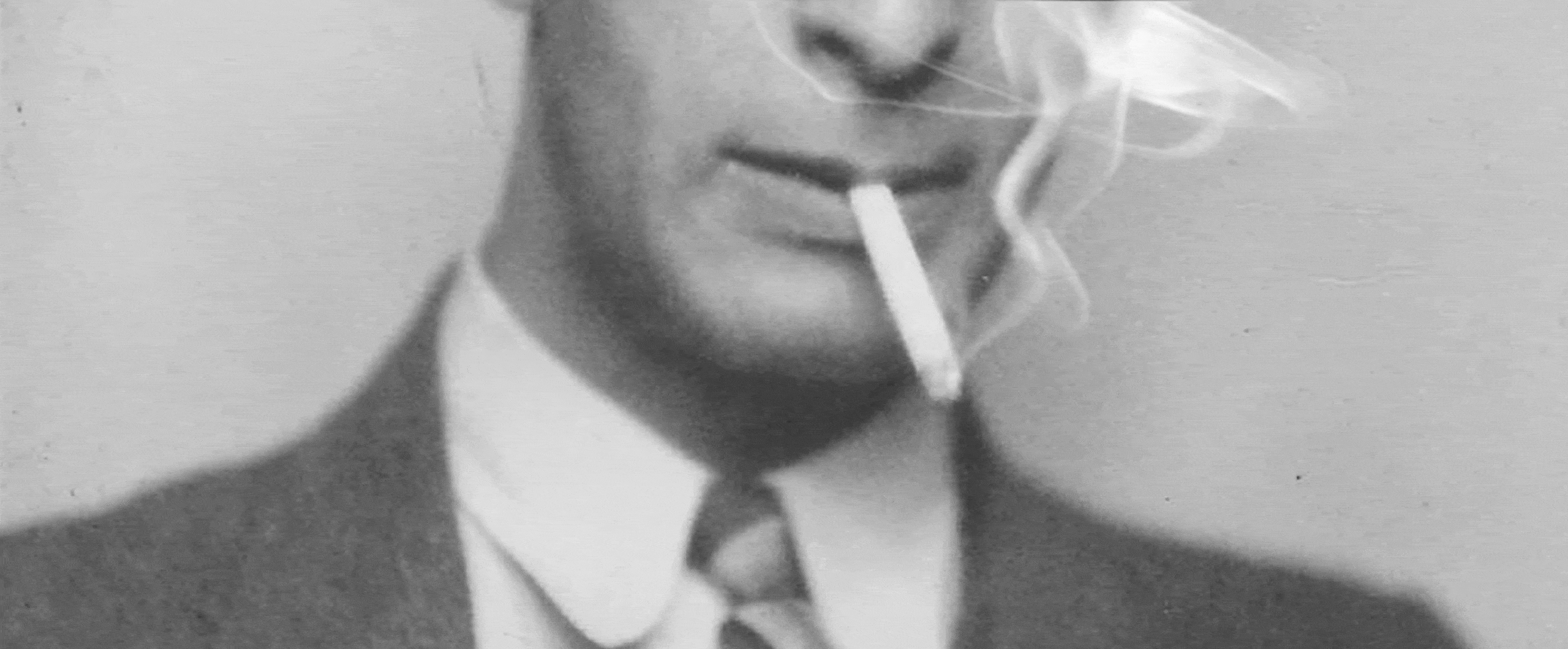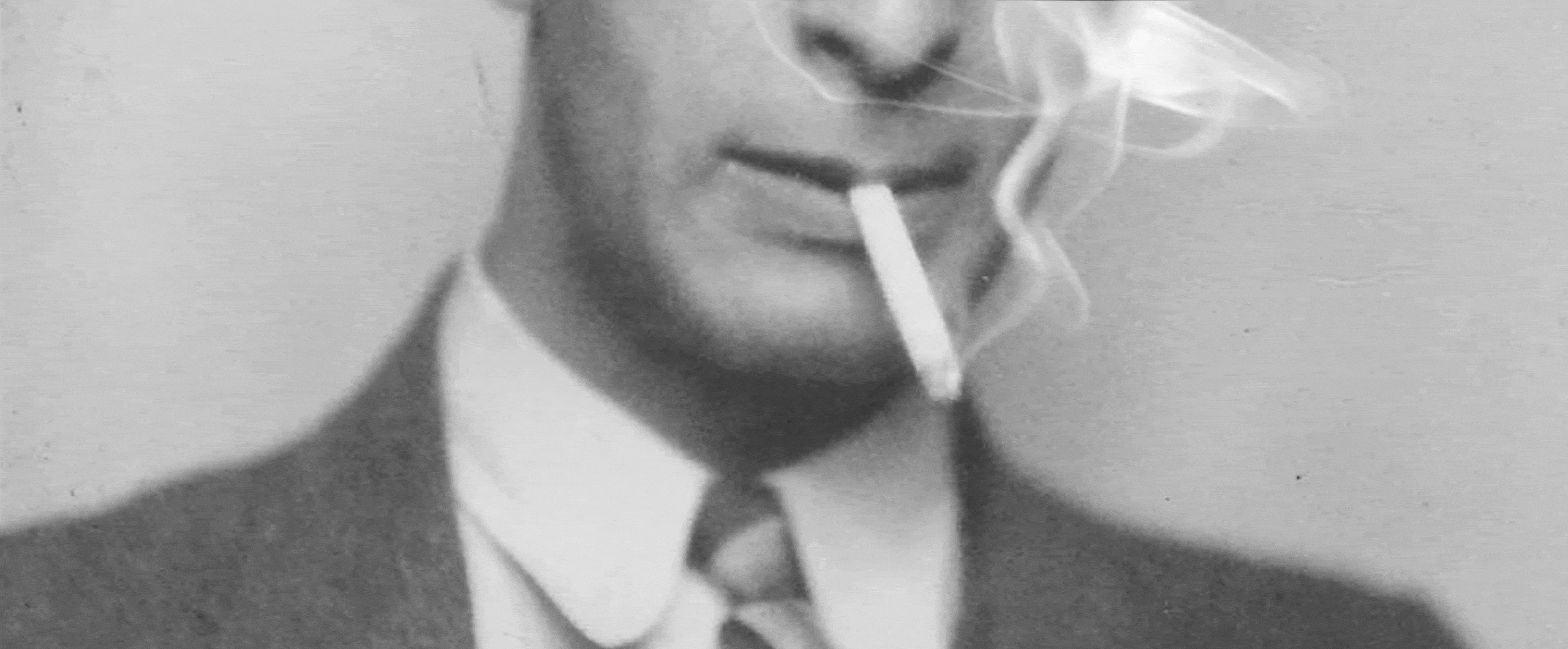My Husband Quit Smoking, Then He Started Again
And that was fine with me: He was a 20th-century Jew




My husband quit and then started again and then quit again and finally took to smoking out of sight. Or so he thought. One day, my very healthy athletic son-in-law came up to me in the garden and said, in an ominous whisper, “Do you know that Herman is smoking? I saw him out the window.” “Yes,” I said. “I know.” A look of disgust came across his face. “He’ll die,” he said. “Yes,” I said. So will you, I thought, but didn’t say. I also didn’t say that Herman had started smoking when he was in the Army on a troop ship headed for England in 1941 when he was 18. He smoked his way across the channel and landed on day two on a Normandy beach. He smoked all the way through the battle of the Bulge and up to the entrance of Dachau. He and four other GIs were in charge of a truck-size decoding machine. They stood in the trenches and sent word back to the generals of progress or disaster. All he ever said about the war was that he was dry because they had to keep the machine dry and also that he and his group carried a duffel bag of books with them. It contained Thomas Mann, Jane Austen, Dostoyevsky, Marx, Harriet Beecher Stowe, and Albert Payson Terhune’s dog stories.
Herman smoked through medical school and internship and through a dozen personal hard things that made him sad but also made him strong. It wasn’t so easy to quit. He was not lacking in will power. He made it to college and became a physician out of grit despite an impoverished, difficult immigrant family that had been evicted onto the streets when he was 15. He learned to speak without a Brooklyn-mixed-with-Yiddish accent from the Saturday afternoon movies he watched each week. When I met him he spoke English like Clark Gable, and he was still in love with Katherine Hepburn. He supported his own family and sent all his children to school and graduate school. He cared intensely about his patients. He just had a hard time giving up the comfort of cigarettes.
It had to do with old anxieties, with words he couldn’t say, with worries about his family, with the great pain and guilt about his early divorce. He was a strong man, but he could never stop smoking completely.
And there were other imperfections. He liked to pretend while driving down the Long Island Expressway that he was a World War I flying ace. He referred to our car as his Sopwith Camel. He needed to be the first car in line, but there is no first on a highway so we were always passing someone, driving over the speed limit, getting stopped by cops with sirens blaring. I was sure I would die in a crash and I had dreams of body parts and melted fenders and steering wheels in sunken chests. “I am a good driver,” he would say when I would scream aloud. He must have been right because he died of a heart attack in our lobby shortly before his 82nd birthday.
And I was never scratched or bruised or bumped.
He could lose his temper at a particularly bad moment with a child. He could be silent for long periods of time when he didn’t like the company or didn’t want to say what he was thinking.
He wasn’t as politically deft as he might have been and he didn’t fight for his original research work as forcefully or successfully as he might have.
But he loved babies and watched them on the subway; he created nurseries to observe the way they attached and detached from their mothers and fathers. He was a psychoanalyst who never had a summer vacation without some patient arriving in the neighborhood.
He didn’t accept all the psychoanalytic positions held by his colleagues. He never agreed with the 1950 view of homosexuality held by the other Freudians. He wanted, for his homosexual patients, exactly what he wanted for his heterosexual patients: love and work, to feel pleasure and pain, and to live as free of inner conflict as the mortal condition would allow. After he died, I received a condolence letter from a former patient who said he had always hoped Dr. Roiphe would be the best man at his wedding to his male partner of then-20 years. The timing was close, but not close enough.
When I met him, he was very shy and did not make much noise in a group. The shyness slowly passed. He loved to cook for friends, especially fish he had caught and skinned and prepared for the grill himself. He loved Patrick O’Brian’s novels of the sea and model boats of the French-English wars. Every few months he would go to the bookstore hoping a new Patrick O’Brian had been released. If it hadn’t he would reread an old one. He loved Trollope and Dickens and George Eliot. He read each of them dozens of times. He made his own blueberry and raspberry jam from berries he picked with his own hands from bushes.
He was a terrible dancer. They didn’t teach social dancing in the Flatbush of his childhood. It embarrassed him to dance. I loved dancing, but a mate is not a mirror image, and I did remind myself that my mean and not-so-sane first husband was a great dancer. It was not a skill that served us well in the few years before our impossible relationship hit the wall.
In Flatbush, his father, sometimes employed as a deliverer of milk, sometimes as a cigar-factory worker, would read him the early chapters of Genesis. He would ask his father questions: Why two versions of the creation story? What was wrong that Rebecca preferred Jacob to Esau? and so on. His father could only say that was the story he had been taught in his Cheder in a small village in Lithuania.
Herman was a school child. He was his class valedictorian at James Madison and had received a full scholarship to Harvard, which did not include living expenses, so he went to Columbia instead, commuting three hours each day. Midway through in his freshman year, he joined the Army.
He was bar mitzvahed in a small shul and he didn’t like the Old World, dusty aura of the men there. He was a boy attracted to chemistry, to science, to America, and the shul was to him baggage from the old country. He left it and became a socialist, a liberal mind, but with a Jewish heart and a Jewish identity and a belief in reason; calculus above Torah. He was in this way a typical Jewish boy from his place and his time. Only he loved the stories from Genesis and he read them aloud to each of his children.
When we went to Israel in the early ’80s, he said he wished we had made our lives there. He said he would have still been a doctor, but a general practitioner who drove from moshav to moshav and kibbutz to kibbutz taking care of the citizens of Israel. He loved drip irrigation and ripe tomatoes.
We all have alternate lives. He was with Darwin and against rabbinical laws but he was with Herzl and Ben Gurion and Ahad Ha’am. He was a Jew of his time and place.
He hadn’t learned to play tennis and he hadn’t learned not to say: “Ha, I win and you lose” when a board game came to its end. He loved the Brooklyn Dodgers, and he and his friends would sit in the bleachers all summer. And he, like all the little boys who played stick ball on the alphabet streets, felt betrayed when the team abandoned Brooklyn. Later he loved the Yankees, and there was real pain on his face when someone said in a terrible, angry voice that the entire nation hated the Yankees. It turned out that was because the team had too much money and purchased more than their share of good players. That statement came from a Boston Red Sox fan one of our daughters admired. Herman said nothing. It doesn’t matter, he said to me later. She likes him. I live my own life.
When his father died in a small apartment in Washington Heights shortly after we were married, there was one treasure the old man had: a shoebox filled with Herman’s report cards filled with gold stars, a few science medals from high school, and a note from an Army officer about the excellence of his son. It looked like a form letter to me, but maybe not. That shoebox was filled with the treasure that the old man, still with heavy accent, had found on the streets of America, and it was quite a treasure, in fact.
The drift of assimilation, the rise in class, the winning of place in America brought good things to Herman, but he spoke of a sadness he had because he couldn’t really talk to his father anymore. They had such different languages and experiences. There were some long, awkward silences between those two men.
I think now, 10 years after Herman’s death, that he was my lover, my friend, and also a Jewish man who lived the Jewish life of his time—the assimilating life; the educated, Western life; the Roosevelt-loving political life; the deep shock of the war and the killing life filled with the sweet dedication he felt for his patients; the Jewish connection he held to Israel; the hard anti-romantic view of God, whom he always complained about, or directly to, accusing him of cruelty, of absence. He was a kind of Jew in a particular place and a particular time. And while I wish he had stopped smoking, I understand and love him despite, or maybe especially for, his less-than-perfect moments. He smoked because he couldn’t say everything he thought. He smoked because there were knots of anger, disappointment, and sorrow, in his brain. That was fine with me.
Anne Roiphe is a novelist and a journalist.